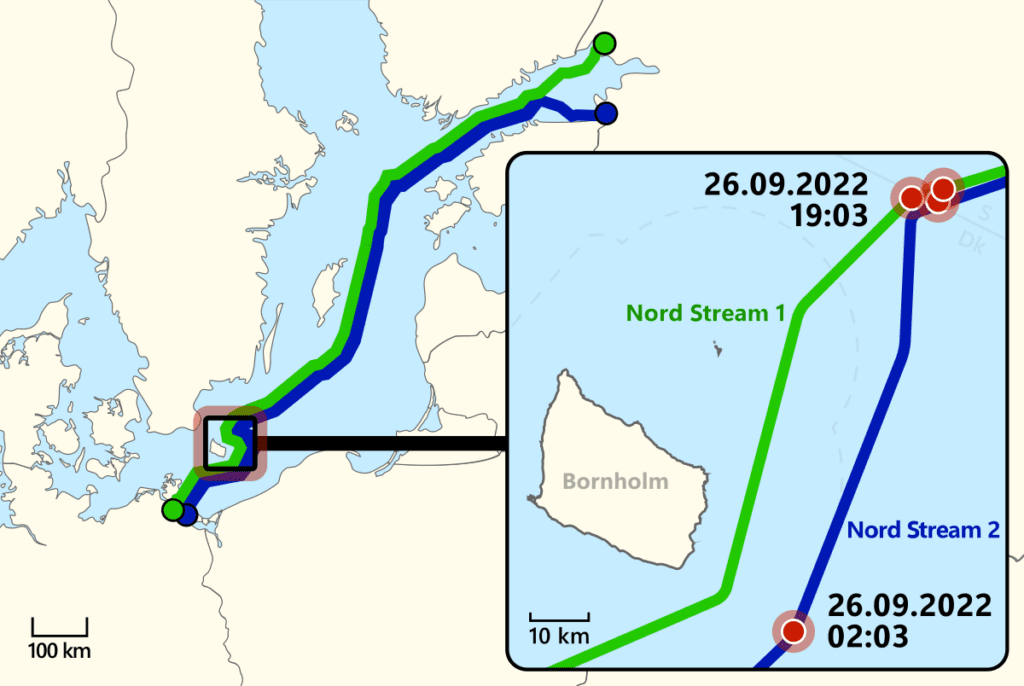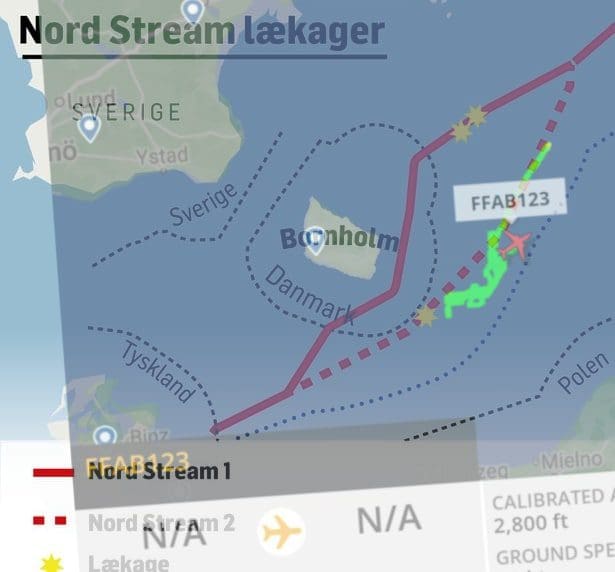By now it has become clear for the entire international community what many suspected from the start: whatever happened below the Baltic Sea, resulting in the catastrophic rupture of both Nord Stream pipelines was no accident. What were Germany’s primary instruments of acquiring gas from Russia before the war in Ukraine fell victim to a meticulously planned and executed act of sabotage carried out by one or more international actors. Since this fact makes the operation the most significant attack on European infrastructure in modern history, it appears even more puzzling that no apparent culprit has been identified yet. Despite the enormous strategic and economic implications, we need to settle for hypotheses for now and likely forever; even if the investigations conclude with an official narrative, it will be hard to tell truth and propaganda apart in the fog of war. Nonetheless, let us look at each possibility, and then see what this attack means for Europe. One disclaimer is warranted, however: motive does not equal guilt, especially in international relations, and it is always wise to keep that in mind.
Putin’s Gambit
After the shocking events of the past seven months, it seems an entirely plausible suggestion that the sabotage was yet another Kremlin-backed ploy. But given the fact that it damaged Russian pipelines that Moscow not only invested in heavily but also used as significant political leverage over Europe, the argument quickly loses its edge. Nevertheless, there is some merit to the ‘Russia did it’ theory, so it is worth analysing it in detail.
First, it is important to note that neither pipeline was in use at the time of the attack. Germany chose to suspend the purchase of gas via Nord Stream 1 after the invasion of Ukraine while halting the certification process for the nearly finished Nord Stream 2. With that considered, Moscow, departing from the premise that the sanctions will never be lifted until Putin is in power and therefore none of the pipelines will be ever used again, may have decided on sacrificing them as a great strategic gambit, with the aim of sowing discord among NATO members. Russia couldn’t be bothered less by European countries accusing it of the sabotage operation: they also accuse each other, which weakens trust and cooperation between them. Also, the panic caused by the incident gives Russia a political and diplomatic edge in strategic terms. In addition, such a move could also be a powerful show of force; the message being that if Russia can do that so close to home, just imagine what else it is capable of.
But at the end of the day, these arguments fall flat when contrasted with reality. On the one hand, if Russia had been the culprit, I believe we would have seen evidence within the first few hours. The leaks were discovered in Swedish and Danish territories, far from Russian shores. If Russian vessels had attempted to enter that zone, they would have needed to somehow outsmart half a dozen navies in high alert ever since the war broke out. The countries bordering the Baltic Sea scan the area so thoroughly every day that they would have picked up a goldfish with a Z painted over its back, let alone frigates or submarines setting up the charges. In fact, some Russian support ships were in the area around the time of the explosions, but although they were continually monitored, no one detected any activity coming from them that would indicate involvement.

Moreover, Nord Stream was way more valuable to Russia as leverage to be sacrificed to just send a threatening message, especially as Europe does not really look like it could diversify its energy portfolio at the needed pace ahead of the winter. An unused but operational pipeline offers a lot more options to play with than a destroyed one, and Putin surely knows that. When you can suspend or restart the gas flow at any given time at the push of a button, blowing it all up is strategic suicide.
A Scandinavian Surprise
If we follow the ancient Latin wisdom cui bono, that is we ask ourselves who benefitted from the act of sabotage, a couple of European countries come into the picture, specifically those with access to the Baltic Sea or with naval interests in the area, which therefore have the means and the motive to carry out such a complex operation.
It is worth remembering that while the construction of Nord Stream 2 gave rise to aggressive political debates on both sides of the Atlantic, Finland, Sweden and Denmark all gave their permission to the project in the end. It appeared that the German lobby in the Scandinavian capitals was stronger than the American. However, political actors within these countries did raise concerns over the project’s environmental consequences and weren’t too fond of Berlin cooperating with Moscow either. These anti-pipeline sentiments could have strengthened in recent months with Stockholm and Helsinki assuming a strong pro-Atlantic stance by submitting their NATO applications. But these are still hardly sufficient reasons for them to turn to sabotage all of a sudden.
Instead, Polish or Norwegian involvement seems more plausible, albeit for different reasons. Russia isn’t exactly a popular country in Europe at the moment, but still only few countries resort to such aggressive rhetoric with regard to Moscow as Poland. Considering Polish history, this is entirely understandable, but it also means that Warsaw might be tempted to make some dangerously foolish decisions if given a completely free hand, such as the idea of sending peacekeepers to Ukraine, and could easily drag the whole NATO into open conflict. What is more, Poland was the greatest opponent of NS2 on this side of the Atlantic, and never forgave Germany for going through with the project. A strategically questionable, reckless move to disable the pipelines, therefore, could theoretically fit Poland’s profile, especially considering that the Polish Navy was already caught once endangering the construction of Nord Stream 2 by harassing the workers with provocative flyovers in 2021.
Similarly, one can easily imagine Oslo being happy about the incident. Norway’s natural gas fields are enormous, and it has an extensive pipeline network which suddenly made the country 2022’s surprise winner. As most European Union member states decided to quit buying from Putin, Norway quickly overtook Russia as Europe’s largest supplier of natural gas. Additionally, the energy crisis caused prices to soar, which made Norway the only country in Europe with positive economic growth in the second quarter of the year. Of course, this financial spell lasts only as long as the Nord Streams are out of order. So perhaps Oslo didn’t want to wait until a more democratic Russian regime reopens the flow after the war and moved to disable it once and for all while Putin is still there to take the blame.
Now, playing around with these theories is fun, but we all feel that something is amiss. None of the countries above has the reputation of conducting covert operations of such scale, nor do they have that kind of geopolitical weight and significance that would warrant such bold actions. The signs point to larger players instead.
A Fatal Friendship
There are many reasons why the United States (maybe cooperating with Britain) is the most probable culprit behind the sabotaging of the Nord Stream pipelines. Let me recap just some of the most important ones. For instance, there was Radek Sikorski, the former Polish foreign minister’s infamous tweet that strongly implied that Washington was behind the incident. People also like to quote one of President Biden’s press conferences from February, when he said ‘If Russia invades,…there will be no longer a Nord Stream 2, we will bring an end to it…I promise you, we will be able to do that.’ And even though these utterances prove nothing beyond speculation, the US’s harsh opposition to Nord Stream 2 has been well-known for at least the last decade and it would make some sense if the Biden administration would follow up with its not-so-covert threats. As Henry Kissinger once famously said, ‘It may be dangerous to be America’s enemy, but to be America’s friend is fatal.’
The timing of the attacks raises some questions, too. Even though the German government appeared to be adamant on keeping its sanctions in place, the German people were much less so. As in other European countries, anti-sanction sentiments were exponentially growing throughout September, and just one day prior to the bombing of the Nord Stream, Germany saw the largest protests so far, organised all over the country, in which people explicitly demanded the reopening of both pipelines to decrease the energy prices. Whoever did blow them up, therefore, was following the German news, and decided not to give Berlin the option of surrendering to its people’s will. Few countries profit off the European energy sanctions both financially and strategically, and none as much as the US.
The technical details also seem to be pointing to the United States. It not only has the means but also the expertise to carry out similar underwater missions. Surrounded by allied nations, its presence on the Baltic Sea draws no suspicion, on the contrary: the American troops deployed in Europe are regarded as guarantors od security. Accidentally, several US Navy vessels were conducting operations exactly where the explosions happened, as part of NATO’s annual BALTOPS exercise in which the members of the Alliance test new underwater technologies, such as drones, torpedoes and special mine destruction systems. Now, even though the exercise ended in July and most ships had already returned home, one fleet was still there and wrapped up its mission just days after Nord Stream was hit. But it gets worse. The flagship of the fleet, the USS Kearsarge carried forty aircraft on board, including several MH-60R Seahawks, dubbed as the world’s most advanced maritime helicopters. These birds carry large electromagnetic sensors perfect for detecting and pinpointing mines—or pipelines, for that matter. One of these very special helicopters appears to have conducted some interesting manoeuvres on 2 September over the exact segment of Nord Stream 2 that was hit three weeks later. The helicopter’s route superimposed on the map of the leakage (below) shows perfectly why some people started to get suspicious.

Finally, just days ago, US Secretary of State Antony Blinken also made some curious remarks when he called the incident a ‘tremendous opportunity’ to finally end Europe’s dependence on Russian energy, to speed up the transition to renewables and to ‘take away from Vladimir Putin the weaponisation of energy as a means of advancing his imperial designs.’ I can hardly imagine anyone being deceived by Blinken’s newspeak, but if so, let me translate: the sabotage is a tremendous opportunity to bar Europe from making any compromises in exchange for gas would it ever choose to do so; to maintain Europe’s newfound dependence on expensive American LNG; and to ensure that the sanctions’ economic pressure remains on Russia, advancing the United States’ geostrategic interests.
Don’t take me wrong: Russia is the number one external threat to Europe at the moment and needs to be neutralised as soon as possible. However, I don’t like the idea of sacrificing Europe’s energy security for it. If the US truly was behind the operation (as the cui bono principle seems to indicate), the fact that it has done it covertly and without the consent of the countries directly affected would be a stain on our alliance that none of us would easily forget.
What Will the EU Do?
But why does this act of sabotage anger so many countries in Europe? After all, the Nord Stream pipelines only carried gas for Germany, while Central Europe’s land routes are still intact. Well, if the first question is whether we’ll have enough energy, the second question must be ‘what will it cost?’ This attack on the pipelines significantly worsened the current energy crisis for everyone, simply because a gas shortage means more expensive gas for us all. The attack on Nord Stream constitutes a serious disregard of the security of Europeans, whether we’ll have to face prolonged shortages in Germany and elsewhere during this winter or not. At the moment, Hungary and most of Central Europe is still connected to the Russian gas networks through several underground pipelines, but how can be certain that no one will try to sabotage those as well? From this perspective, the disabling of the Nord Stream pipelines is not only an attack on German infrastructure, but an attack on all of Europe and on the fundamental trust in each other that’s much needed in times of conflict.
According to a statement by Joseph Borrell, the EU’s foreign policy chief, the bloc views the incident as a ‘deliberate disruption of European energy infrastructure’ which is ‘utterly unacceptable and will be met with a robust and united response.’ Well, apart from throwing around big words, I wonder if the EU’s investigation will yield any results in the coming weeks. It’s one thing to speak harshly, and another to actually do something when faced with formidable opponents. And EU officials do seem to avoid talking about the ‘America theory’ at all costs. If it turns out that it really was Russia, we’ll see endless coverage of the reports coming out, but if the United States turns out to be the most likely offender, the EU might have no choice but to hush up the reports’ findings. Doing so could be just as damaging for NATO as the bombing itself and the European members of the alliance know this as well. In such a high stakes situation that we have been in since February, NATO cannot afford any more divisions. Besides, the harm is already done; the pipeline cannot be repaired for at least one winter, likely more. Nonetheless, perpetrators of such despicable actions need to be held accountable. But I’m afraid that won’t happen if ‘friends’ are involved until well after the war has ended.
In any case and whoever has done it, blowing up the Nord Streams signals that we are entering a new phase of this war. The sabotage operation is a serious escalation that happened outside of the territories of both Ukraine and Russia and involved strategic targets belonging to (potentially) allied nations. In simple terms, it means that the war is no longer about Ukraine only but the herald of a larger and wider conflict between the East and the West, in which both sides have taken up a destructive zero-sum mentality and in turn, made tomorrow even more uncertain.
The expressed in the opinion section are those of the authors and do not necessarily reflect the views of the Hungarian Conservative’s editorial board.








